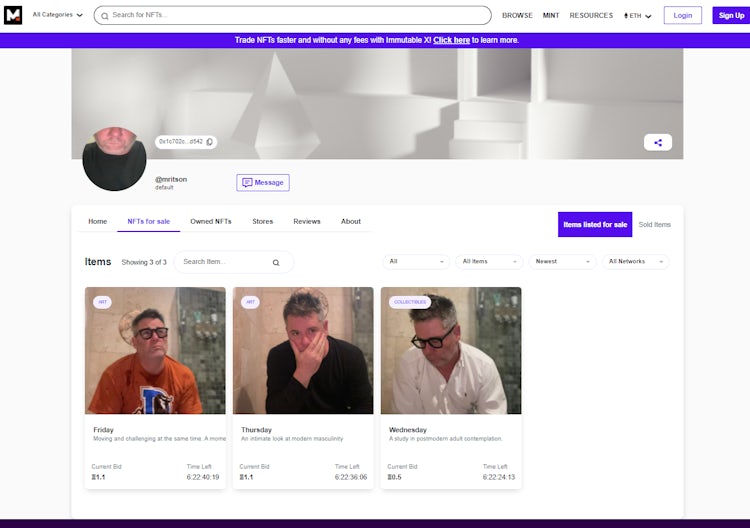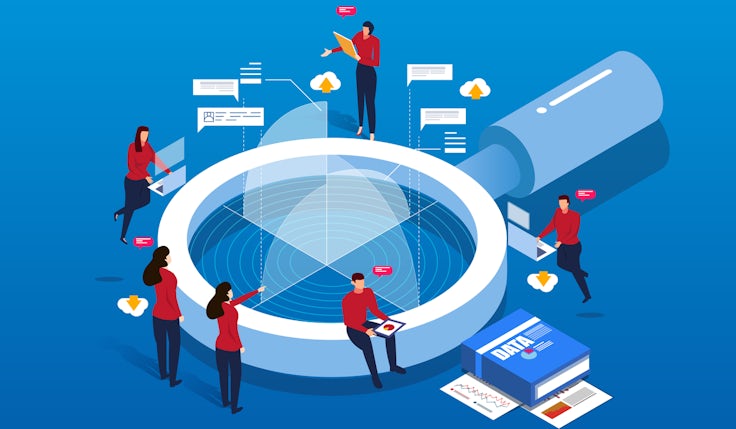NFTs are just marketing’s latest idiot magnet
Marketers just can’t resist pointless fads, which is why you can now buy your own piece of marketing history with my freshly minted series of non-fungible tokens.

I have this steep bit of grass that leads down from my garage to the front of my house. In the summer months it’s a pleasant, bucolic descent towards my front door. But in winter it’s a dark, slippery fucker that will one day take me or one of the other relatives out.
I want desperately to fix it. To put in some big sandstone blocks from the local quarry and ask one of the lads up the valley, an artist with a digger, to carve out my hill and put in natural set of steps. But even if I get lucky with the bloke from the quarry I will need 15 grand, probably 20, to get the job done. And that’s money I don’t have handy right now.
Last month I sat in my garden drinking the last bottle of a quite fantastic little shiraz and staring at my hill. I thought about the steps, that 15 grand and then Ghozali Ghozalo. Ghozalo is a 22-year-old Indonesian student who has been taking a selfie of himself in exactly the same position, every day, for the last five years. He had some lame-ass idea about showing the final animated video string to his classmates when he graduated. But when he was short of cash last month he decided, for a laugh, to try and sell some of these headshots as non-fungible tokens (NFTs).
If you work in marketing you know all about NFTs. They have been bouncing around our discipline for the last 12 months and some people have become very excited about them. When something is fungible – like a £10 note – it is worth the same as another equivalent fungible asset. Irrespective of slight physical differences like a serial number or design, they are all worth the same and are interchangeable. And they can be divided into smaller constituent parts – say 10 £1 coins – and yet maintain their same inherent value.
But who cares about fungibility? The world of marketing is in love with non-fungibility because such things are unique, proven to be scarce and indivisible. Until recently, such traits were the stuff of the non-digital world only: art works and vintage cars, or your pet cat. When you earned something precious in a video game, a magical sword for example, everyone else got that same sword too. And when you stopped playing the game the sword lost all its value forever. Thanks to NFTs, however, people can now buy and sell unique, transferable assets online. And then keep them.
View this post on Instagram
That’s what Sultan Gustaf Al Ghozali, known online as Ghozali Ghozalu, decided to do back in December. It took him a couple of hours to work out the process of minting his photos as NFTs on the online platform Opensea. He priced them at $3 a shot and thought no more about it.
But then celebrity chef Arnold Poernomo came across the collection and bought several of the photos and promoted his purchase on social media. Within a few days hundreds of people had each bought one of Ghozali’s headshots, ensuring the young student made some real money and driving up the price of his other photos. So far, the ‘Ghozali Everyday’ collection has sold more than 500 NFTs and the remaining collection is now worth – at least for now – over $1m.
By the time I got to the bottom of my shiraz you can see why my slippery little entrance and Ghozali Ghozalu were very much top of mind. Young Ghozali is a fine fellow but I am sure he would not mind me pointing out that he isn’t exactly Brad Pitt. And what he did was hardly rocket science either. So I decided to have a go. Over the holidays I snapped myself across three days in pensive, thoughtful mood using my iPhone. Next, I blundered my way (semi-pissed) through various websites that I still do not understand. I eventually managed to ‘mint’ three fantastic NFTs in a series I am now calling ‘I Need a New Set of Steps’.

Each shows its subject on a different day, contemplating very different challenges. Each is a unique portrait available to only one lucky bidder, who will own this small piece of marketing history forever.
All three NFTs are presented here for sale. And, as you can see, each one carries a big emotional charge. ‘Wednesday’ is all about the challenge of postmodern masculinity. ‘Friday’ adopts a more subdued tone and finds its subject contemplating the challenges of marketing management in a time of great change. Finally, ‘Thursday’ captures a disarming moment in time in which its subject struggles with the pressures of working from home and a massive chicken madras from the night before.
Vulnerable to bullshit
Despite the excitement there is, of course, one teeny problem with NFTs. They might be ‘unique’ and buyers can ‘own’ these things but, ultimately, their non-fungibility does not extend to being irreplicable.
The issue came to light last month when Warner Brothers successfully sold 100,000 avatars at $50 a character. Owners were then offered the chance to either maintain their character as sold or, by accepting a red pill, transform it into a Neo-style freedom fighter inspired by The Matrix. Great fun and an easy $5m for Warner Brothers. But, as Professor Keanu Reeves from the University of Comethefuckon noted during the press launch for Matrix Revolutions, this is hardly a whole new way of doing things.
To hear such dissonance about NFTs is both refreshing and unusual, especially coming from Neo. In the marketing world we have taken to this new trend with gusto. As I write this, an army of marketers are extolling the value of NFTs to their followers and thousands of marketing teams have the concept as a bullet point in their 2022 annual planning decks, usually with a question mark immediately next to it. “We know NFTs are super-hot right now,” goes the internal meeting, “how can we harness them for our brand of coffee maker/industrial lubricant/life insurance?” Silence ensues.
And, of course, this sudden popularity should surprise no one. There is something in the DNA of marketers that makes them especially vulnerable to this kind of bullshit.
NFTs are exactly the kind of obscure tactical catnip that our industry simply cannot resist. Equal parts childish game, obscure tech and viral sensation, you can trace the current obsession with NFTs back to their ancestors: VR and Bitcoin and 3D printing and Pokemon Go and Second Life. It’s being going on as long as marketing has existed. You can bet your pension that back in ancient Rome, when the business of brands was being properly developed, there was a small group of loonies standing outside the senate suggesting a mixture of dice, chicken blood and Marcus Aurelius by the light of a new moon was the way to ensure enormous market success.
NFTs are the latest handy distraction that can help you work out which marketers know what they are doing.
In truth, there may be great value in NFTs, way, way down the track when the metaverse takes hold. But it’s a long way off and I’d raise a more important concern; one that applied equally to 3D printing and Bitcoin and Pokemon Go and all the other crap we have collectively lost our disciplinary shit about during the last two decades. What the fuck has any of this go to do with marketing?
Obviously, you can market these innovations. But that applies to literally anything. From bananas to beetle dung. By that measure everything is relevant to marketing. So above and beyond that one universal application, why would any serious marketer give even the smallest of fucks about NFTs?
That point becomes all the more pertinent when you look at the state of modern marketing. Most marketers have no training in marketing. Most don’t know the paradigmatic differences of qual and quant and how to combine them. Or the strategic arguments for and against mass versus target marketing.
Most don’t know the difference between strategy and tactics. Or understand the most basic elements of profitability and the relationship pricing plays. And yet, despite our combined sub-optimal grasp of our own profession, our discipline grows collectively moist at the potential for little pictures sold online using bitcoin.
All is not completely lost, however. There is one very important role that NFT’s play in marketing right now. They operate as perfect idiot magnets. Like the love for a Gary Vee talk or a fascination with Bitcoin, NFTs are the latest handy distraction that can help you work out which marketers know what they are doing and which are trendy, underqualified tech-heads who are not worth a chair.
It’s a sad state of affairs when older and more experienced marketers are too confused or too afraid of their idiot marketing boss to be able to call out the pointlessness of NFTs and all the other hoo-haa that obscures the mission of marketing. But to all those decent men and women I say, ignore this horseshit, this too will pass. And to those addled and obsessed with NFTs and contemplating some future conference speech about how this little, little thing will ‘transform’ and ‘revolutionse’ marketing ‘forever’, I say, get the fuck back to work.
Of course, should you be rich or stupid or contrarian enough to want to own the very moment I originally had this thought, I would still like to draw your attention to the NFT entitled Friday, above. My message to you is before you go back to work, make sure you invest in an important and valuable piece of unique marketing history.








“this too will pass” – do I detect a fan of Mr Hanks and Wittertainment?
Slightly skewed argument to list 3D printing, Second Life and Pokemon Go but ignore TikTok, Facebook, iPhone. All new channels are fads, until they’re not – marketing innovation is about managing that risk and reward. Of course it’s important for any industry not to confuse innovation with their core business but don’t write off innovation entirely. PS I would pay good money now for the original Carling iPint app…
Ok boomer.
If you are a serious Marketing professional and would like to understand why Mark is so obviously missing the real potential of NFT’s please read my rebuttal to his feelings on this subject here: https://www.linkedin.com/pulse/why-marketers-need-understand-nfts-real-potential-listen-wallace/?trackingId=otGgAMJAVGwHWVrRZ6Oo8w%3D%3D